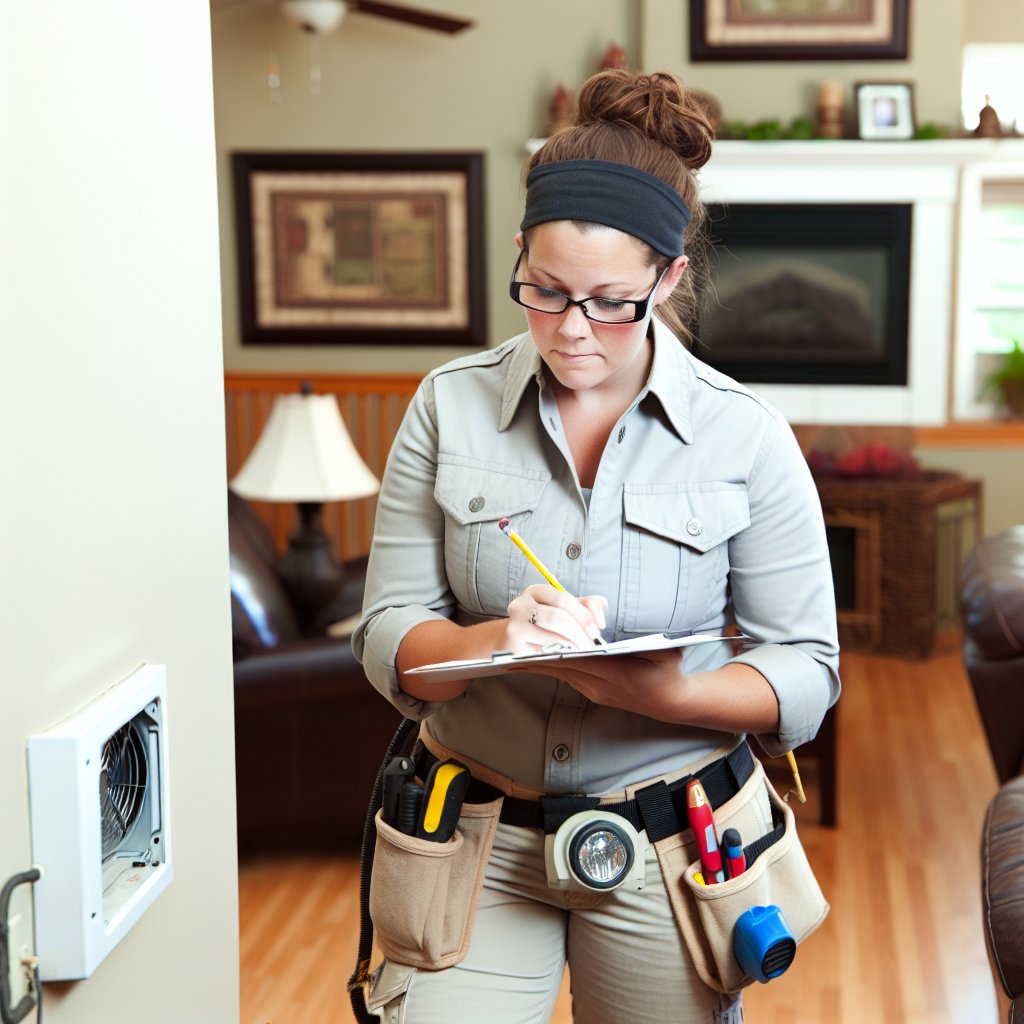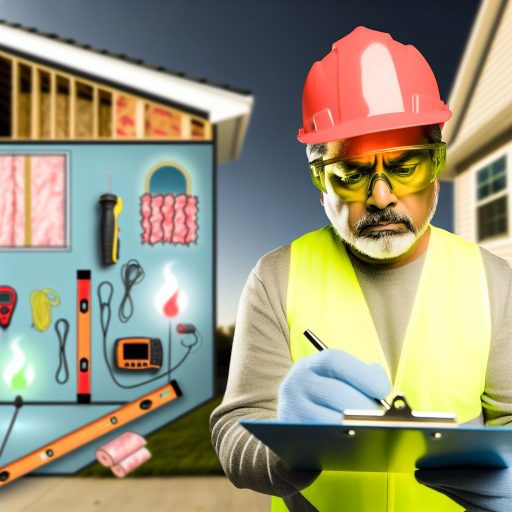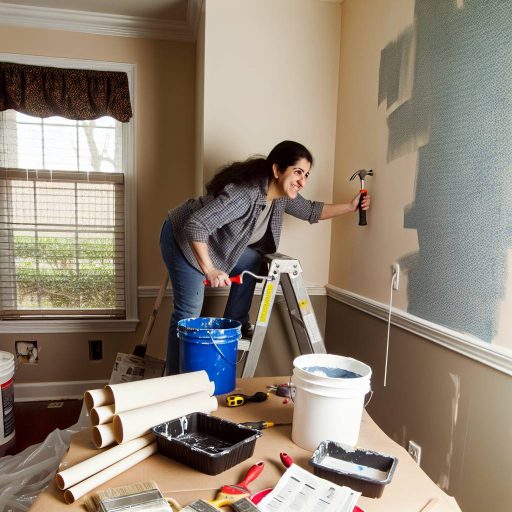Understanding the Importance of Home Inspections for First-Time Buyers
Identifying Potential Issues
Home inspections help buyers identify potential problems before purchase.
Inspectors examine key systems, including plumbing and electrical work.
They look for structural issues that could lead to costly repairs.
Understanding these problems early can save you money in the long run.
Gaining Peace of Mind
A home inspection provides peace of mind for first-time buyers.
You gain confidence in your home’s condition and value.
This step reduces uncertainty surrounding your investment.
Additionally, it allows you to make informed decisions.
Negotiating Power
Home inspections can enhance your negotiating power with sellers.
If issues arise, you can request repairs or price adjustments.
Buyers often leverage inspection reports during negotiations.
This ensures you get a fair deal on your new home.
Understanding Costs and Value
Inspections help you understand the costs associated with homeownership.
Knowing about repairs can guide your budgeting for future expenses.
Overall, an inspection adds value to your home-buying experience.
Prioritizing Safety
Safety is a top priority for first-time buyers.
Home inspections identify safety hazards, including mold or faulty wiring.
Addressing these issues ensures a safe living environment.
Ultimately, it protects your family’s health and well-being.
What to Expect During a Home Inspection
Preparation for the Inspection
Before the inspection, ensure accessibility to all areas of the home.
This includes attics, basements, and crawl spaces.
Furthermore, verify that utilities are turned on.
Key systems like water, gas, and electricity must be functional.
Also, make sure to clear pathways and access points.
Remove any obstacles that may hinder the inspector’s work.
Finally, gather any relevant documentation for the inspector.
Meeting the Home Inspector
Introduce yourself to the home inspector upon arrival.
Discuss any specific concerns you might have.
This allows the inspector to pay extra attention to those issues.
Moreover, feel free to ask questions during the process.
It’s important to understand what the inspector finds.
A good inspector will explain issues in layman’s terms.
Conducting the Inspection
The inspector will start with the exterior of the home.
They will examine the roof, siding, and foundation.
Additionally, they’ll assess driveways and walkways for damage.
Next, they will move indoors to evaluate the systems.
This includes plumbing, electrical, and HVAC systems.
They will also check insulation and ventilation in the attic.
Lastly, the inspector will assess all major appliances.
Reviewing the Findings
Once the inspection is complete, the inspector will compile a report.
This report will detail all findings and issues discovered.
Review the report thoroughly to understand its implications.
The inspector may highlight urgent repairs needed immediately.
Additionally, they may include maintenance recommendations.
Utilize this information for negotiations with the seller.
Final Steps After the Inspection
Decide how to proceed after reviewing the inspection report.
Consider asking the seller to make repairs before closing.
Alternatively, you may negotiate a lower price based on repairs.
It’s also wise to follow up on any major issues found.
Furthermore, getting estimates from contractors can be beneficial.
This helps in making informed decisions moving forward.
Ultimately, your goal is to protect your investment.
Key Areas to Focus on During a Home Inspection
Understanding the Roof
The roof protects your entire home from the elements.
Inspect for missing shingles or signs of wear.
Look for leaks, especially in valleys and around chimneys.
A professional can assess the condition and lifespan of the roof.
Evaluating the Foundation
The foundation supports your entire home structure.
Check for cracks or signs of settling.
A level foundation indicates stability, which is essential.
Pay close attention to water drainage around the foundation.
Inspecting the Plumbing System
Plumbing is crucial for daily living.
Examine visible pipes for leaks or corrosion.
Proper water pressure and drainage are vital signs.
Do not overlook the water heater’s age and condition.
Assessing Electrical Systems
Electrical systems power your home’s amenities.
Identify any outdated wiring or insufficient outlets.
Check for proper grounding and electrical panel condition.
A licensed electrician should handle significant issues.
Reviewing HVAC Systems
The heating, ventilation, and air conditioning system keeps you comfortable.
Inspect the age, maintenance history, and efficiency of units.
Look for any signs of leaks or unusual noises during operation.
Regular servicing can extend the life of HVAC systems.
Looking at Windows and Doors
Windows and doors play roles in insulation and security.
Check for drafts or condensation between panes.
Ensure that all windows and doors open and close properly.
Look for rot or decay in wooden frames and sills.
Examining Interior Spaces
Interior spaces impact your daily living experience.
Inspect walls, ceilings, and floors for damage or stains.
Pay attention to any signs of mold or pest infestations.
The overall flow and atmosphere should feel welcoming.
Assessing Exterior Features
The exterior of your home should be eye-catching and functional.
Check siding for cracks, peeling paint, or mold.
Inspect walkways, driveways, and outdoor areas.
Landscaping should facilitate proper drainage away from the house.
See Related Content: Focusing On Plumbing And Electrical Aspects In Your Home Inspection Checklist
Common Issues Found in Home Inspections and Their Implications
Roof Problems
Inspectors often find issues with roofing materials.
Missing or damaged shingles are common concerns.
These problems can lead to water leaks.
Additionally, they can result in costly repairs later.
Electrical System Issues
Home inspections frequently reveal electrical problems.
Wiring that does not meet code standards is a crucial issue.
This situation poses safety hazards, including fire risks.
Old or damaged circuit breakers may also be identified.
Upgrading the electrical system can be expensive.
Plumbing Deficiencies
Inspectors often find plumbing issues during inspections.
Leaky faucets and pipes are common problems.
These leaks can lead to water damage over time.
Inspectors may also discover outdated fixtures.
Replacing plumbing systems can significantly impact budgets.
Foundation Concerns
Foundation problems can be serious in a home inspection.
Crumbling or cracking foundations may indicate major issues.
This type of damage can affect the home’s overall stability.
Repairing foundation issues often requires specialized help.
HVAC System Inefficiencies
Heating and cooling systems are frequently inspected.
Older systems may not operate efficiently.
This can lead to higher energy bills for homeowners.
Additionally, lack of maintenance can cause breakdowns.
Investing in a new HVAC system can be costly.
Pest Infestations
Pest infestations are another issue often noted.
Termites and other pests can cause significant damage.
They may weaken structural elements within the home.
Addressing pest problems often involves professional extermination.
This adds an extra layer of expense for homebuyers.
Understanding Common Issues
Identifying these common issues is crucial for buyers.
A home inspection provides insight into potential expenses.
Understanding these concerns helps buyers make informed decisions.
Ultimately, it can lead to a satisfactory home purchase experience.
Discover More: The Role Of Homeowners Insurance For First-Time Homebuyers Explained
How to Choose a Qualified Home Inspector
Research Potential Inspectors
Start by gathering a list of local home inspectors.
Use online resources to find reviews and ratings.
Ask friends and family for recommendations.
Check with your real estate agent for trusted inspectors.
Verify Credentials and Experience
Ensure the inspector is licensed in your state.
Look for certifications from reputable organizations.
Experience is key, so choose someone with several years in the field.
Ask about their specific expertise in residential inspections.
Interview Inspectors
Contact several inspectors for interviews.
Ask about their inspection process and services offered.
Inquire if they use advanced tools and technologies.
Make sure they provide a detailed written report after inspections.
Request Sample Reports
Ask for sample inspection reports to review.
Pay attention to the report’s clarity and detail.
A good report should highlight key issues and recommendations.
It should also be easy to understand for first-time buyers.
Compare Costs
Get estimates from multiple inspectors.
Remember that the cheapest option isn’t always the best.
Consider the value of services offered versus cost.
Make sure there are no hidden fees in the final invoice.
Trust Your Instincts
Choose an inspector you feel comfortable with.
Good communication is crucial during the inspection process.
Trust your intuition about their professionalism and expertise.
Ultimately, you need someone you can rely on for honest feedback.
Gain More Insights: Preparing Financially For Your First Home Purchase In The USA

Preparing for a Home Inspection
Understanding the Importance of Home Inspections
A home inspection identifies potential issues in a property.
It helps buyers make informed decisions about their purchase.
Generally, inspections reveal necessary repairs and maintenance.
Additionally, they offer peace of mind during the buying process.
Finding a Qualified Home Inspector
Start by researching local home inspectors in your area.
Look for inspectors with positive reviews and good qualifications.
Ask friends or family for recommendations if possible.
Ensure the inspector is licensed and insured for your protection.
Interview potential inspectors to assess their experience.
Preparing Your Home for Inspection
As a seller, ensure key areas are accessible for inspection.
Clear away clutter from rooms, basements, and attics.
Make sure all utilities, including water and electricity, are on.
Consider providing a list of repairs you’ve made over time.
Fix minor issues before the inspection day, such as leaks.
Gathering Necessary Documentation
Compile any maintenance records related to the home.
Include warranties for appliances and systems along with documents.
Consider gathering neighborhood information, such as HOA rules.
This documentation can be beneficial for the inspector’s review.
Questions to Ask Your Home Inspector
Prepare a list of questions to maximize the inspection’s benefits.
Inquire about any red flags that arise during the inspection.
Ask for details regarding the home’s major systems.
Clarify any concerns surrounding the property’s age and repairs.
Understanding the Inspection Report
Expect a detailed report outlining findings from the inspection.
The report should describe issues, their severity, and recommendations.
Review the report closely and ask the inspector for clarity.
Use this information to negotiate repairs with the seller.
Remember, not all findings require immediate action.
You Might Also Like: Home Inspection Checklist For Spotting Foundation Issues
Interpreting Home Inspection Reports
Understanding the Basics
Home inspection reports assess a property’s condition.
They include details on structural issues, systems, and safety.
First, familiarize yourself with the terminology used in reports.
Common terms include “deficiency,” “major defect,” and “cosmetic issue.”
Components of a Home Inspection Report
A comprehensive report covers various components of the home.
These components often include the roof, foundation, plumbing, and electrical systems.
Always pay attention to photographs included in the report.
The pictures can help you visualize the condition of specific areas.
Prioritizing Findings
Review the report by categorizing issues into categories.
- Minor repairs
- Major repairs
- Safety concerns
Focus first on major repairs and safety concerns.
Use this categorization to inform your decision-making process.
Seeking Clarification
Don’t hesitate to ask your inspector for clarification.
They can provide insights into the findings and their implications.
Request a follow-up consultation if needed for deeper understanding.
Using the Report in Negotiations
A well-interpreted inspection report can strengthen your negotiation position.
Use findings to discuss necessary repairs with the seller.
Negotiate for repairs, price reductions, or credits towards the purchase.
Next Steps After Interpretation
After interpreting the report, consider hiring specialists for major issues.
For example, consult a licensed contractor or electrician.
This ensures you get detailed assessments and accurate repairs.
Finally, keep the inspection report for future reference.
This document can be helpful for any potential future transactions.
Negotiating Repairs After a Home Inspection
Understanding the Inspection Report
The home inspection report is vital for negotiations.
Review it in detail to understand potential issues.
Make a list of repairs that concern you the most.
Highlight items that impact safety and major systems.
Prioritizing Repair Requests
Focus on critical repairs over minor cosmetic fixes.
Consider the costs associated with each repair item.
Organize requests based on urgency and importance.
Communicating with the Seller
Approach the seller with a cooperative mindset.
Clearly express your concerns using the inspection report.
Use specific language to explain why repairs are necessary.
Maintain a professional tone throughout discussions.
Making Compromises
Be prepared to negotiate and find middle ground.
Consider asking for credits instead of repairs.
This option allows you to control how repairs are addressed.
Using Your Agent’s Expertise
Leverage your real estate agent’s experience in negotiations.
They can provide valuable insights and strategies.
Work together to present your case effectively.
Establishing a Reasonable Timeline
Discuss and agree on a feasible timeline for repairs.
This helps manage expectations for both parties.
Ensure that the timeline is included in any agreement.
Getting Estimates for Major Repairs
Consider obtaining estimates for significant repairs.
This provides a clear understanding of repair costs.
Present this information to the seller during negotiations.
Finalizing the Agreement
Once negotiations conclude, document everything in writing.
Ensure all agreed-upon repairs and credits are included.
This protects both parties and clarifies responsibilities.
Additional Resources
Buying a Lennar home , what am I doing? : r/Homebuilding




